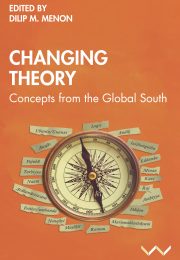Ethnographies of Power
Working Radical Concepts with Gillian Hart
Contributor(s): Ahmed Veriava, Alex Loftus, Bridget Kenny, Jennifer A Devine, Jennifer Greenburg, Michael Ekers, Stefan Kipfer, Zachary Levenson
- Publication Date: August 2022
- Dimensions and Pages: 229 x 152mm Extent: 240pp
- Paperback EAN: 978-1-77614-666-6
- eBook EAN: 978-1-77614-677-2
- PDF EAN: 978-1-77614-771-7
- Rights: OPEN ACCESS
- Recommended Price (ZAR): 300
- Recommended Price (USD): 20
This book is available as a FREE DOWNLOAD – find it here https://library.oapen.org/handle/20.500.12657/57561
Gillian Hart has pioneered a distinctive school of critical ethnography, exemplified by these
exciting explorations of South Africa and beyond. This collection of ethnographic studies
advances Hart’s theories of the intertwining of global and local processes and the articulation
of material, cultural and political relations.
—Michael Burawoy, Professor of Sociology, University of California, Berkeley, and author of Manufacturing Consent, Politics of Production and Public Sociology
A rich reservoir of concepts critical in making sense of, critiquing and building our social world.
— Asanda Benya, Senior Lecturer in Sociology, University of Cape Town
In our time of rampant inequality, imperial-capitalist plunder, violence and ecocide, when radical concepts from the past seem inadequate, how do researchers and students of ethnographic work decide what concepts to work with or renew?
Gillian Hart is a key thinker in radical political economy, geography, development studies, agrarian studies and Gramscian critique of postcolonial capitalism. In Ethnographies of Power each contributor engages her work and applies it to their own field of study.
A major contribution of this collection is the merging of theory with praxis, resulting in invaluable research tools for postgraduate students. These include applying ‘gendered labour’ practices among workers in South Africa, reading ‘racial capitalism’ through agrarian debates, using ‘relational comparison’ in an ethnography of schooling across Durban, reworking ‘multiple socio-spatial trajectories’ in Guatemala’s Maya Biosphere Reserve, critiquing the notion of South Africa’s ‘second economy’, revisiting ‘development’ processes and ‘Development’ discourses in US military contracting, reconsidering Gramsci’s ‘conjunctures’ geographically, finding divergent ‘articulations’ in Cape Town land occupations, and exploring ‘nationalism’ as central to revaluing recyclables at a Soweto landfill. Together, the chapters show how important the ongoing reworking of radical concepts is to ethnographic critiques of power.
Ethnographies of Power offers an invaluable toolkit for activists and scholars engaged in sharpening their critical concepts for social and environmental change towards a collective future.
Short summary:
Working with key concepts developed by Gillian Hart a social theorist and human
geographer, this book argues for a critical ethnographic approach to advance social
justice movements for a radically different world. It offers an invaluable toolkit for
activists and scholars engaged in sharpening their critical concepts for social and
environmental change.
Keywords: Human Geography; critical development studies; Disabling Globalisation;
Development Geography; Gillian Hart; theory on the left; Gramsci; South Africa
The publication of this volume was supported by funding from the National Institute for the Humanities and Social Sciences (NIHSS)
List of Illustrations
Acronyms and Abbreviations
Introduction: Working Radical Concepts with Gillian Hart – Sharad Chari, Mark Hunter and Melanie Samson
Chapter 1 The Politics of ‘Gendered Labour’: Gillian Hart’s Relational ‘Conjunctures’ – Bridget Kenny
Chapter 2 Micro-foundations for ‘Racial Capitalism’: ‘Interlocking Transactions’ – Sharad Chari
Chapter 3 ‘Relational Comparison’ and Geography’s Question of Method – Mark Hunter
Chapter 4 ‘Multiple Trajectories of Globalisation’ – Jennifer Devine
Chapter 5 A Conversation with Gillian Hart about Mbeki’s ‘Second Economy’ – Ahmed Veriava
Chapter 6 ‘D/developments’ after the War on Terror – Jennifer Greenburg
Chapter 7 ‘Articulation’, ‘Translation’, ‘Populism’: Gillian Hart’s Engagements with Gramsci – Michael Ekers, Stefan Kipfer and Alex Loftus
Chapter 8 Make ‘Articulation’ Gramscian Again – Zachary Levenson
Chapter 9 What is ‘Nationalism’? Thinking Alongside Hart at a South African Landfill – Melanie Samson
Contributors
Index
Editors:
Sharad Chari is an associate Professor in the Department of Geography, University of California at Berkeley, USA. He is affiliated to the Wits Institute for Social and Economic Research (WiSER) and its project on Oceanic Humanities in the Global South. He is author of Fraternal Capital: Peasant-workers, Self-made men, and Globalisation in Provincial India.
Mark Hunter is professor in the Department of Human Geography, University of Toronto Scarborough, Canada. His book Race for Education: Gender, White Tone, and Schooling in South Africa (2019) has won the The Canadian Association of African Studies’ 2020 Joel Gregory Book prize. He is Honorary Research Fellow, Built Environment and Development Studies at the University of KwaZulu-Natal.
Melanie Samson is Associate Professor of Sociology at the University of Johannesburg.
Gillian Hart has pioneered a distinctive school of critical ethnography, exemplified by these
exciting explorations of South Africa and beyond. This collection of ethnographic studies
advances Hart’s theories of the intertwining of global and local processes and the articulation
of material, cultural and political relations.
—Michael Burawoy, Professor of Sociology, University of California, Berkeley, and author of Manufacturing Consent, Politics of Production and Public Sociology
A rich reservoir of concepts critical in making sense of, critiquing and building our social world.
— Asanda Benya, Senior Lecturer in Sociology, University of Cape Town

